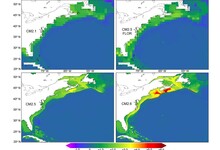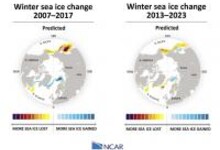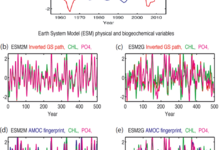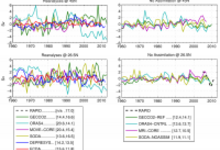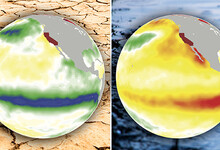Research Highlights
We aim to feature the latest research results from US scientists whose published paper features work that is sponsored by one or more sponsoring agency programs of US CLIVAR (NASA, NOAA, NSF, DOE, ONR). Check out the collection of research highlights below and sort by topic on the right. Interested in submitting an article for consideration? See our Research Highlight Submission Guidelines page for more information.
In the Northwest Atlantic, the ensemble of global climate models has a warm bias in sea surface temperature due to a misrepresentation of the Gulf Stream position; thus, existing climate change projections could be underestimating the warming rate in the upper ocean by two to three times, according to new research by Saba et al.
Climate model projections provide a compelling reason to believe that anthropogenic warming will lead to a pronounced reduction in Arctic sea ice extent over the course of this century and beyond, but there is no reason to expect this long-term sea ice retreat to occur steadily through time.
The underlying physical driver for the decadal variability in the Gulf Stream path and the regional biogeochemical cycling is linked to the low-frequency variability of the large-scale ocean circulation in the Atlantic, also known as Atlantic meridional overturning circulation (AMOC).
Contrary to the conventional expectation that the imposition of subsurface data constraints will draw the AMOC in reanalysis products into agreement, Karspeck et al. finds that the historical AMOC variability is less consistent among the reanalysis products than in corresponding simulations without subsurface data constraints.
In the future, the Pacific Ocean's temperature cycles could disrupt more than just December fishing. Known collectively as the El Niño Southern Oscillation, or ENSO, the changing seasonal phenomena known as El Niño and La Niña could lead to at least a doubling of extreme droughts and floods in California later this century.

